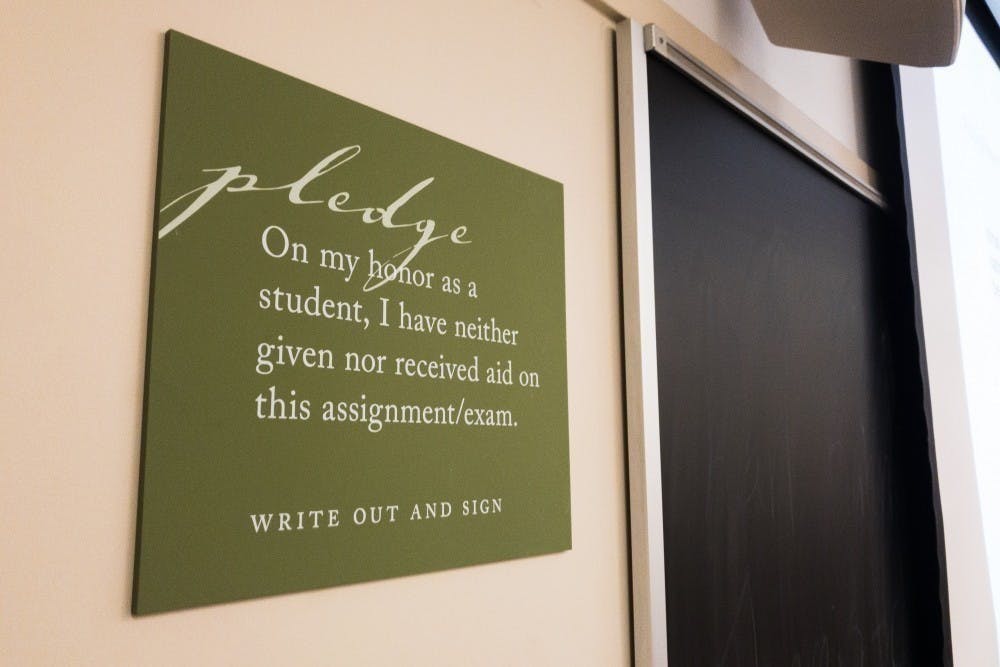Since its founding in 1842, the Honor Committee has expelled hundreds of students. Those expelled for honor violations make up a small fraction of the University population, but the continued expulsion of students raises the question — why do honor convictions merit expulsion?
Other than tradition, the typical justification for expelling students convicted of honor offenses is maintaining a community of trust. If a student leaves the University after committing an honor offense, the rest of the student population ostensibly becomes more trustworthy. Yet many students who admit to honor offenses already remain at the University after suspension. Expulsion fails because it undermines both the consistency of honor penalties and reporting rates for honor offenses.
The introduction of the Informed Retraction in 2013 and the Conscientious Retraction in 1982 compromise the logic of expulsion. Both policies ensure that students who committed honor offenses without a contributing health impairment can remain at the University. If students convicted of honor offenses violate the community of trust, so do students who have made CRs or IRs. The distinction between these groups is procedural — according to proponents of the IR, students eventually convicted of honor offenses can lie throughout the adjudication process, but students who make an IR can only lie up to seven days after receiving an IR letter.
Including cases where a guilty verdict is correct, convicted students are not necessarily lying at hearings. The Honor Committee currently defines an honor offense as “a Significant Act of Lying, Cheating or Stealing” that is “committed with Knowledge.” The definition of significance is subjective — according to the Honor Committee, an act of lying, cheating or stealing is significant “if open toleration of it would harm the community of trust.” Because the honor system does not base verdicts on precedent and the subjectivity of a violation’s significance, accused students can know they lied, cheated or stole without believing they violated the honor code.
The reliance on student reporting introduces another complication to the penalty of expulsion. According to a 2012 student survey conducted by the Honor Committee, only 42.27 percent of students would unreservedly report an honor offense they witnessed. In a more recent report, the 2017 Honor Audit Commission Student Survey, 34 percent of students said their most likely deterrent to reporting an honor offense was “uneasiness about the possibility of the student being dismissed from the University.” Although only one graduating class polled in the 2017 survey remains at the University, these survey results suggest expulsion is sometimes a deterrent to students reporting honor offenses.
Faculty are also skeptical of expulsion as a penalty. Before the IR, an open-ended faculty survey from 2006 mentioned expulsion 85 times. Not all of these mentions were critical, but many were. More recently, in the 2017 Honor Audit Commission Faculty Survey, 23 percent of faculty said their most likely deterrent to reporting an honor offense was “uneasiness about the possibility of the student being dismissed from the University.”
Even without the IR, the current honor system does not enforce expulsion as a single sanction. Some students, particularly students of color, are more likely to face sanctioning. Wealthy students can threaten lawsuits to influence verdicts. With or without contacting the Honor Committee — in accordance with Honor Committee bylaws — faculty routinely lower the grades of students suspected of honor violations, potentially affecting academic standing. Anyone who opposes the single sanction opposes a system that already punishes most guilty students with penalties less than expulsion. If the vast majority of students who commit honor offenses are not expelled — and reporting rates are lower due to potential expulsion — the honor system should exclude expulsion as a penalty for honor offenses.
Many students who oppose the single sanction still support expulsion as a penalty for serious cases, but proponents of a multiple-sanction system only propose changes to the hearing process, not the IR. Under the current honor system, students can make an IR regardless of the severity of the offense. Since the IR and its penalty apply to even the most serious cases — and since the difference between IRs and convictions does not rest on seriousness — the Honor Committee should, for consistency, eliminate the penalty of expulsion for even the most serious convictions.
In deterrence theory, deterrence is both specific and general — discouraging repeat offenders and potential new offenders. When it enforces the penalty of expulsion, the Honor Committee eliminates deterrence for those already convicted of honor offenses — expelling them, not rehabilitating them. Students who support both the IR and expulsion must reconcile why a leave of absence can effectively deter students who make an IR but not those convicted at hearings.
The alleged benefits of the honor system — unproctored exams, take-home exams, professors believing excuses — do not require the penalty of expulsion. The benefits of the honor system existed even in years when the Honor Committee did not expel students. Other institutions, including two mentioned in the Honor Committee’s Multiple Sanction Honor Systems Report, exclude expulsion as a penalty for honor violations, at least for undergraduates. To improve reporting rates and sanctioning consistency, the Honor Committee should propose a constitutional amendment lowering the penalty for honor convictions. The honor of the many does not depend on the expulsion of a few.
Adam Grim is a Viewpoint Writer for The Cavalier Daily. He can be reached at opinion@cavalierdaily.com.
The opinions expressed in this column are not necessarily those of The Cavalier Daily. Columns represent the views of the authors alone.
CORRECTION: A previous version of this article stated that "students who make an IR can only lie up to seven days after the Honor Committee contacts them." The article has been updated to reflect the correct time period.







